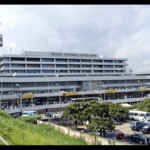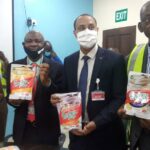
With the election of its new President, Airline Operators of Nigeria are looking forward to securing more favourable policies for the industry as well to strengthen their relationship with the federal government.
Industry experts identified four key factors that determine the success of domestic airlines in Nigeria. They are government policy; cost and availability of aviation fuel; airport infrastructure; as well as charges and taxes.
These key factors are determined by government and are critical in determining the fate of the industry.
Therefore, government is largely instrumental to the success or failure of domestic operators.
Other variables that could also be monitored by government are financial well-being of airlines, which could be checked by government through economic regulation by the Nigerian Civil Aviation Authority (NCAA). NCAA also regulates aircraft acquisition and management, recruitment of technical workforce and daily operations of airlines.
What this means is that for domestic airlines to succeed they must have to work with the federal government and there must be good understanding, geared with the sole purpose of having a viable and purposeful aviation industry.
THISDAY learnt that this was a key factor that determined the choice of the new leadership of Airline Operators of Nigeria (AON) a fortnight night ago when the Chairman of Max Air, Alhaji Abdulmunaf Yunusa Sarina, was elected as the President and Chairman of CEO of Air Peace, Allen Onyema was elected the Vice-President after the end of the second tenure of the former Chairman of the organisation, Captain Nogie Meggison.
FG’s New Approach
There has always been clamour by domestic airlines for government’s protection by curtailing the inroad of foreign airlines, supporting them in their international operations and ensuring that aviation fuel is available and at a good price.
They have also been calling on government to review charges leveled on the local operators, including tariffs on aircraft and spares, facilitate their negotiation for operational approvals with other countries and designate them to more international routes.
The current administration has started acquiescing to some of these requests and has adopted the principle of reciprocity to enhance the opportunities of local carriers in their international operations.
The President Muhammadu Buhari administration through the Minister of Aviation, Senator Hadi Sirika has stopped the tariff on aircraft spares and during the evacuation insisted that all evacuations bankrolled by the federal government must be conducted by domestic carriers, except in destinations such could not be possible.
So it was a new approach and a new rapport between the airlines and the federal government and with this new disposition, it became critically important that the airlines must elect a person who is fully aware of the challenges of the airlines and can also prod his way in the government circles.

Expectations
Airline operators, industry observers believe that this is the opportune time for domestic airlines to have rapprochement with government, push for favourable policies on critical issues that affect their business and ensure that government is with them all the way.
The Director General of NCAA, Captain Musa Nuhu recently explained in an interview that if a Nigerian airline is seeking for approval to operate to any country, it should notify the Ministry of Aviation, NCAA and the Ministry of Foreign Affairs.
These government organs will send their representatives to accompany the airline along with the Nigerian ambassador to that country. When this is done, such country will treat the request of the airline with the seriousness it deserves.
The NCAA boss noted that if the airline abides by this and the country fails to honour that request, the federal government would now retaliate through NCAA. Some airlines have commended Nuhu for that advice and it also echoes the disposition of government to the airlines; it wants the airlines to succeed.
The Chief Executive Officer of Top Brass and former Managing Director of the Nigerian Airspace Management Agency (NAMA), Captain Roland Iyayi, said the election of new President for AON is a continuity because the association would continue to clamour for those things that the previous administration has demanded from the government.
He said AON would continue to mount campaign for the review of taxes and charges against airlines, noting that this demand has been on so the new executive would continue from where the previous administration left off, adding that the approach might be different this time.
“We are supposed to be engaged with the authorities to review the multifarious taxes and charges because nothing has been concluded yet. So it is just a continuity from where the last administration left off; but the approach should be different,” Iyayi said.
The Top Brass boss explained that why it is difficult for Nigerian airlines to meet their demands on review of charges, support for international operation and waiver for tariffs on imported spares is because some government officials do not appreciate the critical role these airlines play in the economy of the country.
He said some officials of agencies in the aviation industry show open preference to foreign carriers and frowned at the remarks made by a senior government official in one of the aviation agencies who said that foreign airlines pay their taxes and charges promptly but they spend the money earned to push domestic airlines to pay up their debts.
Iyayi said when government agencies have the kind of officials with such mindset, the industry would not grow as projected and it would be difficult for government to yield to the request of the domestic players.
He said domestic airlines buoy the nation’s economy because without domestic airlines there would not be access to many of the nation’s airports and there would not be quick movements from one point to another.
“We have only five international airports and 21 domestic airports, while foreign airlines operate to the five, domestic airlines operate to additional 16 airports, which means that without domestic airlines you will not access to different parts of the country by air; so domestic airlines should be given a fair chance.
“The challenges they face should be reviewed because we need to encourage the domestic operators. This is where the leadership should take a cue from,” he said.
Job Creation
Iyayi noted that Nigerian carriers provide most of the jobs in the industry outside that of the aviation agencies and remarked that foreign airlines provide 20-30 jobs directly and any other one would be on contract like engaging the services of haulage and others.
“These are what I believe people should look at. If you don’t have people that understand the situation well there would be a problem,” he said.
Speaking in the same vein, the Director of Engineering, Ibom Air, Lukeman Animaseun called for greater unity among domestic carriers in order to collectively push for policies that would aid the success of the operators.
He said issue of Value Added Tax (VAT) should be resolved because the airlines still pay VAT despite the belief that it was been removed, adding that the airlines should now push for its final remove.
“Also on the payment of duty on imported spares, the system chose to deal with the airlines individually but there should be a comprehensive policy on this so that all the airlines will benefit collectively,” Animaseun said.
He also noted that there should be more collaboration among domestic airlines, whereby they would code-share some routes by allowing one airline that has strength on the route to operate it while others that also operate to that destination would sell their tickets but one airline would airlift the passengers to the route on behalf of the other operators.
After the airlines would reconcile their accounts. He said this would enable the carriers to ensure the make good load factor on every route they operate.
Collective Demand
Industry analyst and Secretary General of Aviation Round Table (ART), Group Captain John Ojikutu (rtd), said that over the years, except for the time in the 90s when the AON was headed by Dr. Steve Mahonwu of the defunct Okada Air, the leadership of the organisation has been from the private aircraft operator and the aspirations of the private charter operator and that of schedule service providers differ in some areas. This he said had led to the failure to have collective push for changes that would favour the scheduled operators.
“What I believe they need to do first is to collectively demand that the foreign airlines should be restricted to two international airports out of the five airports so classified.
None of them should be cleared to Lagos and Abuja but Lagos or Abuja and any other from alternate geographical zone. The aim is to ensure that the domestic routes and markets benefits are not infringed upon by the foreign airlines. However, the foreign airlines can operate as many frequencies as they wish daily or weekly to the two airports of their choice. To further help themselves, the AON must review members business plans before they are submitted to the NCAA for approval to avoid the recycling of the business plans that have been found to be another reasons for their short lifespan and the general setbacks of the industry,” Ojikutu said.
He lamented that there are 38 known taxes and charges leveled on airlines but only 11 are necessarily charges on the airlines…. “Only VAT is a tax; four are statutory charges, two are non statutory while four are operational support services charges and two of these are optional. The remaining are charges on other operators and support services not on the airlines.
The eleven charges on the airlines are include VAT (FIRS) not the NCAA nor FAAN; Processing aircraft licensing and registration/renewal fees; Personnel licensing and registration/renewal Fees. (Optional); airlines licensing and registration/renewal fees; aircraft inspection fees. Others are simulator training inspiration fees; ATC terminal navigational charges; enroute navigational charges; landing and parking charges and avo-bridge charge, which is optional.
Reawakening
The Chief Executive Officer of Mainstream Cargo Limited, Seyi Adewale said the last AON executives having contributed their quota to sub sector wellness needed to step aside due to their significantly diminished role and stake in the industry.
However, the newly inaugurated AON executive is the reawakening of the association because this leadership is current, relevant and major stakeholders in this sub-sector.
“The new President and the Vice President have between them over 30 passenger aircraft and constituting over 50 per cent of the entire domestic (scheduled flight) aircraft fleet. They are directly and most significantly impacted by Covid 19 Pandemic, taxation, maintenance, exchange rate, aviation fuel cost etc. furthermore, the new executives have enough ‘weight and stature’ to influence policy and pressure government to consider their charge,” he said.

He said that AON should concentrate its demands on the immediate release and access to palliatives, grants, waivers and incentives as indicated by the federal government.
“The commercial domestic airlines need funding support for their Operations post-Covid -19 lockdown. This will ensure they don’t go under. AON should exert more or sustain the pressure on government to disallow foreign airlines from multiple entries into the country.
Government should encourage and incentivize these foreign airlines to partner local airlines through Code-Sharing and/ or be their feeder, encourage joint trainings that lowers their high overall training costs, discourage unhealthy rivalries or competition and resolve conflicts within members or with government agencies, set up monitoring committee to oversee agreed initiatives and report its progress and assist in resolving disputes with aviation unions,” Adewale said.
THISDAY






